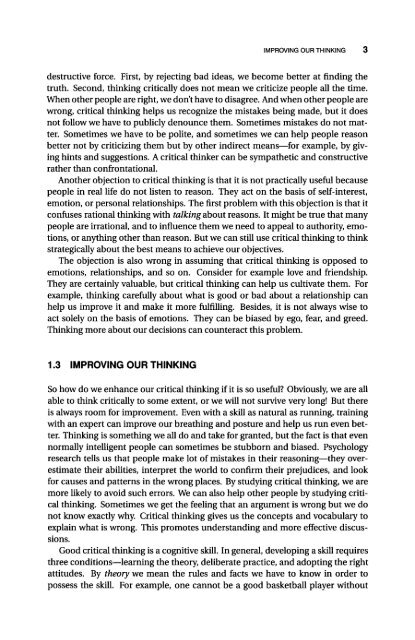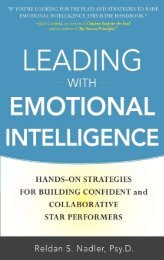An Introduction to Critical Thinking and Creativity - always yours
An Introduction to Critical Thinking and Creativity - always yours
An Introduction to Critical Thinking and Creativity - always yours
You also want an ePaper? Increase the reach of your titles
YUMPU automatically turns print PDFs into web optimized ePapers that Google loves.
IMPROVING OUR THINKING 3<br />
destructive force. First, by rejecting bad ideas, we become better at finding the<br />
truth. Second, thinking critically does not mean we criticize people all the time.<br />
When other people are right, we don't have <strong>to</strong> disagree. <strong>An</strong>d when other people are<br />
wrong, critical thinking helps us recognize the mistakes being made, but it does<br />
not follow we have <strong>to</strong> publicly denounce them. Sometimes mistakes do not matter.<br />
Sometimes we have <strong>to</strong> be polite, <strong>and</strong> sometimes we can help people reason<br />
better not by criticizing them but by other indirect means—for example, by giving<br />
hints <strong>and</strong> suggestions. A critical thinker can be sympathetic <strong>and</strong> constructive<br />
rather than confrontational.<br />
<strong>An</strong>other objection <strong>to</strong> critical thinking is that it is not practically useful because<br />
people in real life do not listen <strong>to</strong> reason. They act on the basis of self-interest,<br />
emotion, or personal relationships. The first problem with this objection is that it<br />
confuses rational thinking with talking about reasons. It might be true that many<br />
people are irrational, <strong>and</strong> <strong>to</strong> influence them we need <strong>to</strong> appeal <strong>to</strong> authority, emotions,<br />
or anything other than reason. But we can still use critical thinking <strong>to</strong> think<br />
strategically about the best means <strong>to</strong> achieve our objectives.<br />
The objection is also wrong in assuming that critical thinking is opposed <strong>to</strong><br />
emotions, relationships, <strong>and</strong> so on. Consider for example love <strong>and</strong> friendship.<br />
They are certainly valuable, but critical thinking can help us cultivate them. For<br />
example, thinking carefully about what is good or bad about a relationship can<br />
help us improve it <strong>and</strong> make it more fulfilling. Besides, it is not <strong>always</strong> wise <strong>to</strong><br />
act solely on the basis of emotions. They can be biased by ego, fear, <strong>and</strong> greed.<br />
<strong>Thinking</strong> more about our decisions can counteract this problem.<br />
1.3 IMPROVING OUR THINKING<br />
So how do we enhance our critical thinking if it is so useful? Obviously, we are all<br />
able <strong>to</strong> think critically <strong>to</strong> some extent, or we will not survive very long! But there<br />
is <strong>always</strong> room for improvement. Even with a skill as natural as running, training<br />
with an expert can improve our breathing <strong>and</strong> posture <strong>and</strong> help us run even better.<br />
<strong>Thinking</strong> is something we all do <strong>and</strong> take for granted, but the fact is that even<br />
normally intelligent people can sometimes be stubborn <strong>and</strong> biased. Psychology<br />
research tells us that people make lot of mistakes in their reasoning—they overestimate<br />
their abilities, interpret the world <strong>to</strong> confirm their prejudices, <strong>and</strong> look<br />
for causes <strong>and</strong> patterns in the wrong places. By studying critical thinking, we are<br />
more likely <strong>to</strong> avoid such errors. We can also help other people by studying critical<br />
thinking. Sometimes we get the feeling that an argument is wrong but we do<br />
not know exacdy why. <strong>Critical</strong> thinking gives us the concepts <strong>and</strong> vocabulary <strong>to</strong><br />
explain what is wrong. This promotes underst<strong>and</strong>ing <strong>and</strong> more effective discussions.<br />
Good critical thinking is a cognitive skill. In general, developing a skill requires<br />
three conditions—learning the theory, deliberate practice, <strong>and</strong> adopting the right<br />
attitudes. By theory we mean the rules <strong>and</strong> facts we have <strong>to</strong> know in order <strong>to</strong><br />
possess the skill. For example, one cannot be a good basketball player without
















